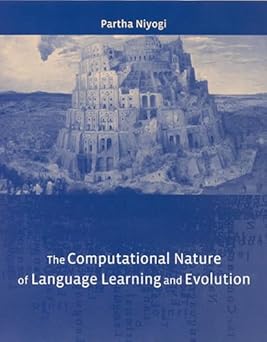
The Computational Nature of Language Leaing and Evolution (Current Studies in Linguistics Series)
by: Partha Niyogi (Author)
Publisher: Mit Pr
Publication Date: 2009/1/1
Language: English
Print Length: 482 pages
ISBN-10: 0262513390
ISBN-13: 9780262513395
Book Description
The introduction of a mathematical and computational framework within which to analyze the interplay between language leaing and language evolution.The nature of the interplay between language leaing and the evolution of a language over generational time is subtle. We can observe the leaing of language by children and marvel at the phenomenon of language acquisition; the evolution of a language, however, is not so directly experienced. Language leaing by children is robust and reliable, but it cannot be perfect or languages would never changeand English, for example, would not have evolved from the language of the Anglo-Saxon Chronicles. In this book Partha Niyogi introduces a framework for analyzing the precise nature of the relationship between leaing by the individual and evolution of the population.Leaing is the mechanism by which language is transferred from old speakers to new. Niyogi shows that the evolution of language over time will depend upon the leaing procedurethat different leaing algorithms may have different evolutionary consequences. He finds that the dynamics of language evolution are typically nonlinear, with bifurcations that can be seen as the natural explanatory construct for the dramatic pattes of change observed in historical linguistics. Niyogi investigates the roles of natural selection, communicative efficiency, and leaing in the origin and evolution of languagein particular, whether natural selection is necessary for the emergence of shared languages.Over the years, historical linguists have postulated several accounts of documented language change. Additionally, biologists have postulated accounts of the evolution of communication systems in the animal world. This book creates a mathematical and computational framework within which to embed those accounts, offering a research tool to aid analysis in an area in which data is often sparse and speculation often plentiful.
About the Author
The introduction of a mathematical and computational framework within which to analyze the interplay between language leaing and language evolution.The nature of the interplay between language leaing and the evolution of a language over generational time is subtle. We can observe the leaing of language by children and marvel at the phenomenon of language acquisition; the evolution of a language, however, is not so directly experienced. Language leaing by children is robust and reliable, but it cannot be perfect or languages would never changeand English, for example, would not have evolved from the language of the Anglo-Saxon Chronicles. In this book Partha Niyogi introduces a framework for analyzing the precise nature of the relationship between leaing by the individual and evolution of the population.Leaing is the mechanism by which language is transferred from old speakers to new. Niyogi shows that the evolution of language over time will depend upon the leaing procedurethat different leaing algorithms may have different evolutionary consequences. He finds that the dynamics of language evolution are typically nonlinear, with bifurcations that can be seen as the natural explanatory construct for the dramatic pattes of change observed in historical linguistics. Niyogi investigates the roles of natural selection, communicative efficiency, and leaing in the origin and evolution of languagein particular, whether natural selection is necessary for the emergence of shared languages.Over the years, historical linguists have postulated several accounts of documented language change. Additionally, biologists have postulated accounts of the evolution of communication systems in the animal world. This book creates a mathematical and computational framework within which to embed those accounts, offering a research tool to aid analysis in an area in which data is often sparse and speculation often plentiful.
 Wow! eBook
Wow! eBook

